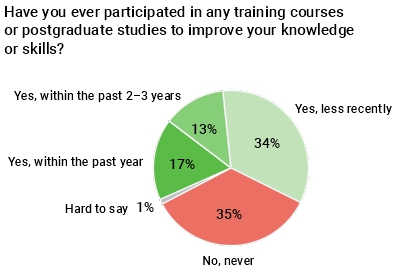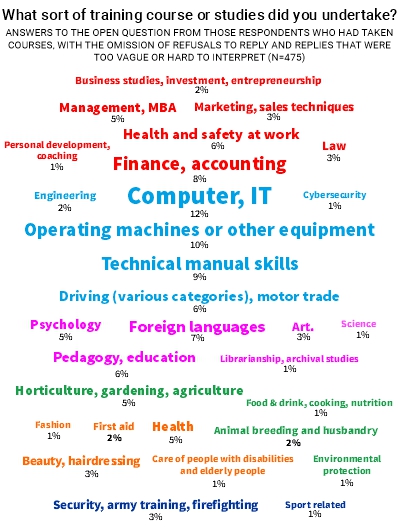29/2024
2024-12-03
What Sort of Courses Do Polish People Take?
October’s survey was the first time CBOS asked Poles about the courses they took to improve themselves and raise their qualifications beyond what they had achieved within the standard education system. The survey revealed that a majority (64%) of Polish people participated in supplementary courses or postgraduate studies to add to the knowledge and skills they had gained at school or university. Every sixth person surveyed (17%) said they had undertaken such a course within the last year, for one in eight (13%) it was within the last 2–3 years, every third respondent (34%) had taken a course less recently, while over a third of those surveyed (35%) had never done so.

|
The courses people took were very varied, though certain subjects came up much more frequently than others. Foremost were IT and computer courses (indicated by 12% of those who had undertaken supplementary training), from basic computer skills to advanced programming. In second place were courses connected with the operation of machines or equipment other than computers (10%), such as diggers, fork lifts or cash registers. The third most frequently mentioned category was manual skills training, such as welding, bricklaying or locksmith services. Less frequently mentioned were finance and accounting courses, with foreign languages bringing up the first five (7%).

|
More on this subject in the CBOS report.
This ‘Current Events and Problems’ survey (414) was conducted using a mixed-mode procedure on a representative sample of named adult residents of Poland, randomly selected from the National Identity Number (PESEL) register. Respondents independently selected one of the following methods: Computer Assisted Personal Interview (CAPI); Computer Assisted Telephone Interview (CATI), respondents receiving researchers’ telephone numbers in an introductory letter from CBOS; Computer Assisted Web Interview (CAWI), where respondents filled in the online questionnaire independently, gaining access by means of a login and password provided in an introductory letter from CBOS. In all three cases the questionnaire had the same structure and comprised the same questions. The survey was carried out between 3 – 13 October 2024 inclusive on a sample of 1025 people (59.9% using the CAPI method, 24.7% CATI and 15.4% CAWI).. CBOS has been conducting statutory research using the above procedure since May 2020, stating in each case the percentage of personal, telephone and internet interviews.





